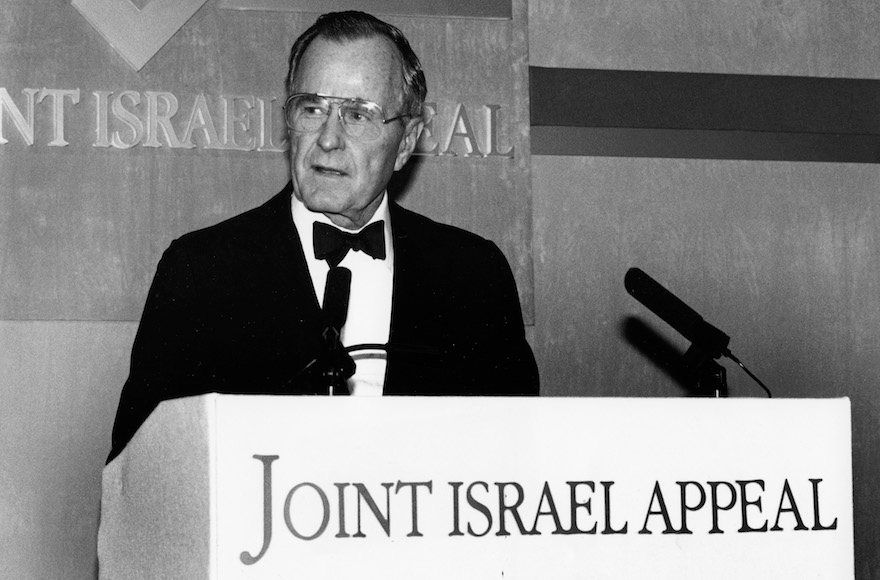Israel turns 70 this year. To mark the anniversary, JTA’s Ron Kampeas describes the U.S.-Israel friendship through portraits of all 13 presidents who have been in office during the Jewish state’s history. For other articles in the series, click here.
To get this unique look at Israel & the Presidents directly in your inbox, sign up here.
(JTA) — George H.W. Bush was involved in Soviet Jewry advocacy since his days as ambassador to the United Nations under President Richard Nixon. As vice president to Ronald Reagan, his responsibilities included efforts to free Jews in distress — not only in the former Soviet Union but in Ethiopia and in Syria.
Bush quarterbacked Secretary of State George Schultz’s confrontation with the Soviets over Russia’s captive Jews and was instrumental in persuading the Syrian dictator, Hafez Assad, to allow young Jewish women to immigrate to the U.S. so they could marry within the faith. As president, he gave the nod to the Marxist Mengistu regime in Ethiopia that led to Operation Solomon, the mass airlift to Israel in 1991.
Following his success in the 1991 Gulf War, Bush convened the multilateral Arab-Israeli peace conference in Madrid. It was marked by his tensions with Israeli Prime Minister Yitzhak Shamir. But in retrospect, Bush was as tough on the Arab interlocutors, and just the fact that Saudi Arabia, Gulf states and North African countries sat at the table with Israel led to Israeli diplomatic inroads in those countries.
Pro-Israel activists will never forget — or forgive — when Bush said he was “one lonely guy” facing off against “thousands of lobbyists on the Hill.” He was referring to lobbyists from the American Israel Public Affairs Committee, who in 1991 were pushing back against his pledge to suspend loan guarantees to Israel unless it froze settlement building.
But lacking Reagan’s easy charm, the patrician Bush couldn’t get away with the tough guy talk and instead sounded self-pitying and mildly anti-Semitic. His chief of staff, James Baker, didn’t help things when he reportedly dismissed the prospect of Jewish protestations by saying, essentially but much more crassly, “To hell with them — they don’t vote for us anyway.”
After Saddam Hussein invaded Kuwait in 1990, the Iraqi strongman pelted Israel with missiles. Israel itched to respond, but Bush insisted that Israel take it on the chin so he could assemble as broad a coalition as possible to oust Iraqi forces from Kuwait. Israel complied, and its leaders were stunned when in the war’s aftermath, Bush used American actions to protect Israel during the war as leverage to get Israel to Madrid. It seemed galling because Israel had been reluctant to accept the assistance in the first place.
JTA has documented Jewish history in real-time for over a century. Keep our journalism strong by joining us in supporting independent, award-winning reporting.






